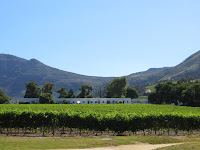South African
wines are capable of turning the head of the most hardened European wine buff.
Producing utterly world class wine, the wines of the Rainbow Nation can give the
greatest producers from anywhere in the world a run for their money. Whether
you love rich reds, young light reds, mineral whites, fruity whites, method traditionelle
sparkling wines, Summery roses, ripe raisiny dessert wines, there is something
for your palate to find delight in here.
There are
hundreds of great wineries in South Africa, so I do not pretend to have visited
them all or have sampled all their wares. I have my liver to think of! But these
are my picks of the wine estates I visited recently. There were others which
were fun to visit or where I had great food, but do not make the cut on their
wines. I hope that these are representative of the best large and small
producers, but further research will be necessary. I will be going back for
more one day!
If you are
visiting South Africa with a view to sampling the viniculture, then Platters
wine guide is a great reference for you. Updated annually, it has a helpful
writeup on each winery, with reports and ratings of their best wines. A five
star review in this “wine bible” is a very big deal in South Africa, and an
indicator of a very special wine.
Groot
Constantia, Cape Town
The beautiful estate is
a pleasure to walk around and you can take in views of Table Mountain as well
as the vines.

 Wine tastings and meals are available, but why not try something
a little different? A bespoke chocolate and wine tasting is available, where
the white, milk and dark chocolates and their flavourings have been developed
to match with Groot Constantia’s white and red wines.
Wine tastings and meals are available, but why not try something
a little different? A bespoke chocolate and wine tasting is available, where
the white, milk and dark chocolates and their flavourings have been developed
to match with Groot Constantia’s white and red wines.
Clos Malverne,
near Stellenbosch
Making wine
since 1986, this winery was one of the first to make a “classic Cape blend”
wine, making use of the grape varieties which are more characteristically South
African.
The grapes have their juices extracted by an antiquated and labour
intensive process; the basket press. This method, done completely by hand, does
not denigrate the grape skins, vital for adding colour and tannins to their red
wines.

The Auret red wine is spectacular. As is the food in the superb restaurant with vineyard views. Very popular with locals, you need to book. If you want a table on the veranda looking directly over the vines and mountains, you should book early.
Warwick
Estate, between Stellenbosch and Paarl
This is a
family run winery, famous for its prizewinning “The First Lady” unoaked
Chardonnay. Norma Ratcliffe is the “First Lady” of Warwick; the first woman to
become a member of the Cape Winemakers Guild and the first to be its Chairperson.
The First Lady Unoaked Chardonnay is a revelation to those of us who convinced ourselves we didn’t like New World Chardonnay in the 1990s due to the industrial strength oaking of these wines.
 |
| Research, naturally! |
I had a super picnic here at Warwick, carefully selected, locally
sourced light bites, cold cuts and salad (grown in the gardens) in the sunshine
looking over the lovely scenery, washed down by the wonderful “Professor Black”
Sauvignon Blanc.
Aaldering,
Devon Valley, Stellenbosch
Fons and
Marianne Aaldering set up this wine farm in 2004 with big ambitions to be one
of the best in South Africa. This very small, almost “boutique” winery is punching
well above its weight, having won awards in both Europe and China.

The red wines are the star here, with their Pinotage and their Cabernet Sauvignon-Merlot blend being some of the best I tasted.
The peace and quiet of
Devon Valley are another draw for this cute little wine estate.
You can stay in
one of three traditional Cape Dutch lodge houses if you plan on spending time
in the vicinity of Stellenbosch.
Bramon, Plettenberg
Bay (near Knysna), The Garden Route
Most of the
wineries of South Africa are in the Stellenbosch/Paarl area. However, this
winery is located on the “Garden Route”; the expanse of woods and greenery you
reach as you leave the Karoo, sandwiched between the hills and coast.
“Bramon” is the conflation of the names of brother and sister owners Bram and Manon Thorpe, the winery being a real family concern.
The proximity to the sea adds coolness and sea breeze to the superb “MCC” wines. MCC? Methodé Cap Classique, the same method used to make Champagne (being a protected region, no-one outside of the Champagne region can use the word “Champagne”, which is why you may see “method traditionelle” used elsewhere in the world).
Bramon run an eatery with great
house-made tapas, inspired by local ingredients. The Bobotie cigars are a novel
spin on a quintessentially South African dish.
Snigdha has not received any
incentive, financial or otherwise for posting these recommendations.
























